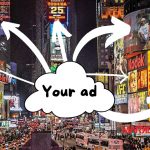The most healthy mindset for any marketer working in the industry today is scepticism, according to Bob Hoffman, aka the Ad Contrarian.
“We’re living in a fantasy land. Being a sceptic makes you a better marketer,” he said, talking at the Festival of Marketing: The Bottom Line, as reported by Adweek. It’s a fantasy land where consumers want to have deeper relationships with brands and invite them into their lives. That, Hoffman stressed, just isn’t true.
“I’m sorry, they just don’t care that much,” he said. “Most people are perfectly satisfied with having the shallowest of connections with us.” Brand loyalty is a myth, born of consumer habits and convenience. Equally, there’s a huge difference between brand acceptability and brand love. “Most of your customers don’t love you and never will,” he added.
… The ad agency has allowed itself to crawl into bed with the squids at Facebook and Google and the rest of the devious ad tech weasels. It makes us look like fools….
The advertising and marketing industry has lost touch with the real world and all this talk of cultural anthropologists and brand architects is doing little more than papering over some pretty dramatic and damaging cracks, he claimed. And it’s being caused by unreliable opinions and advice. “I don’t know anything, I’m faking it,” Hoffman admitted. “I always have been. I have no idea why anybody buys anything.”
Instead, the industry likes to go in for precision guessing, or best practice as it’s known. With so many variables in play, a lot of success can be down to pure luck, or circumstance, he suggested. “Often what works, works a little,” Hoffman said. “That’s what marketing does, mostly it works a little.”
The ad agency has allowed itself to crawl into bed with the squids at Facebook and Google and the rest of the devious ad tech weasels. It makes us look like fools.
… For years, we’ve been hiding behind the skirts of Facebook and other online platforms. While these companies have been taking the heat, it has been largely unrecognised by the public…
That’s why so many marketers love to talk about the future, he suggested. You can’t get that wrong, because it hasn’t happened yet. Ten years ago, we were supposed to be on the cusp of another golden age, a decade that would unfurl rich with opportunities, as new tools, social media and other digital platforms gave the industry unprecedented access to consumers.
But what happened? “Advertising has gotten worse, it’s less effective,” Hoffman insisted. “It’s more annoying, disliked and avoided. It’s gotten so bad, we have half the trustworthiness of lawyers. Our clients don’t trust us.”
The industry has been rocked by scandal, data security breaches and fraud.
As the Brooklyn-born Hoffman put it: “Anyone who is not sceptical of our current assumptions and the direction of the marketing industry is out of touch with reality.”
… Go into any marketing or media agency in the world and something immediately becomes obvious. Everyone’s young. It’s nothing but narcissism disguised as strategy. It’s marketing by selfie-stick.”
There have been massive repercussions from all of this. The unintended political consequences of the surveillance economy, one much loved by the advertising and marketing economy, has led directly to the radicalisation of politics in the United States and events of recent months, including the attack on the Capitol Building in Washington, he said. Taken on those terms, advertising has become a major menace.
“There’s a clear line connecting tracking, ad tech and political radicalisation and destabilisation,” Hoffman stressed. While the role of social media in stirring unrest has been widely reported, there is a deeper wedge that has been driven in part by data and information gathered by tech companies and the resulting algorithms used to sell ad space. Content hooks in more visitors and recommendation tools do much to bring extremists together within one platform, he said.
“We need to be more honest about ourselves,” Hoffman urged. “For years, we’ve been hiding behind the skirts of Facebook and other online platforms. While these companies have been taking the heat, it has been largely unrecognised by the public that it is for the sole benefit of the advertising and marketing industry that Facebook and others do their squalid work. We are the hidden hand that guides and finances these dangerous practices.”

A code of silence, a conspiracy within the industry, around various scandals, most notably ad fraud, has totally eroded trust. “One can only wonder what additional sleaze media agencies know of and are keeping quiet about,” Hoffman said. “The ad agency has allowed itself to crawl into bed with the squids at Facebook and Google and the rest of the devious ad tech weasels. It makes us look like fools.”
He said the more you find out about online ad fraud, the more you understand how corrupt and unreliable it is. According to reports, ad fraud increased by 50% in 2020, at a cost of $60bn (£44bn). This was supposed to be a time of more accountability and of greater measurement, but no one’s really sure what it is that they’re supposed to be measuring; “accountability is more faith than fact,” Hoffman declared.
Old people aren’t dead
Switching his focus from algorithms to demographics, Hoffman questioned why the advertising and marketing industry continued to obsess over younger audiences at the expense of an over-50s market that regularly outspends other consumers in nearly every category, including online.
“The real reason that we ignore older people is because we hate them,” he said. “Go into any marketing or media agency in the world and something immediately becomes obvious. Everyone’s young. It’s nothing but narcissism disguised as strategy. It’s marketing by selfie-stick.”
It’s not just a problem when it comes to consumer engagement. “We have allowed and sometimes forced talented people to leave, while replacing them with inexpensive, inexperienced, unproven people,” Hoffman added.
“Our industry throws talent away every day. For decades, we’ve been accused of being too airy-fairy. Our reaction has been to overreact and become data-driven instead of idea-driven. We’ve lost confidence in the creative process, and would rather invest in activities that yield charts and graphs that our clients can understand. Ideas and creativity are too ethereal. We can’t measure them, so we have devalued them.”

Bob Hoffman is author of five Amazon #1 selling books about advertising. He also writes the almost-weekly Ad Contrarian Newsletter.
MARKETING Magazine is not responsible for the content of external sites.









